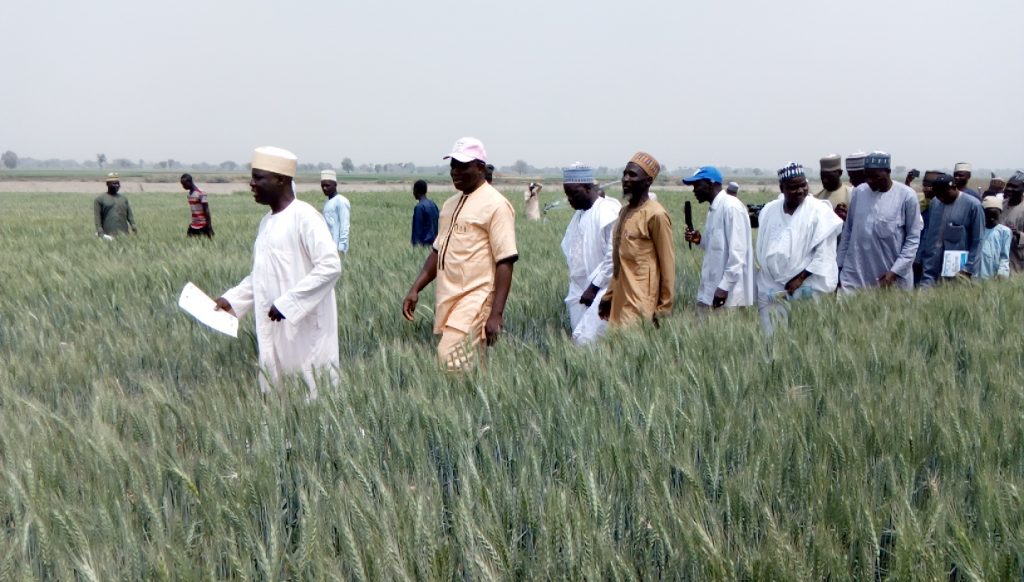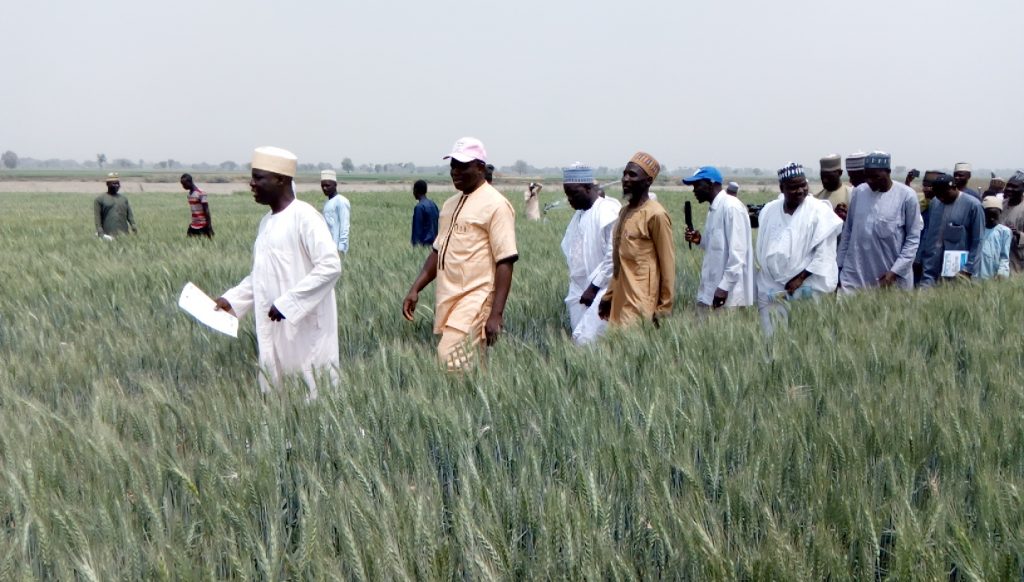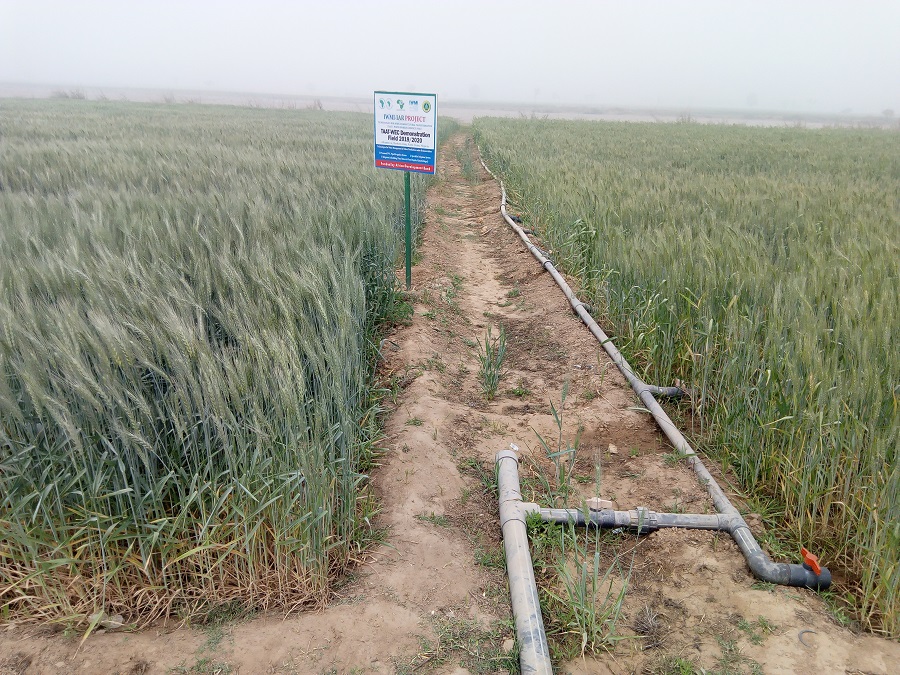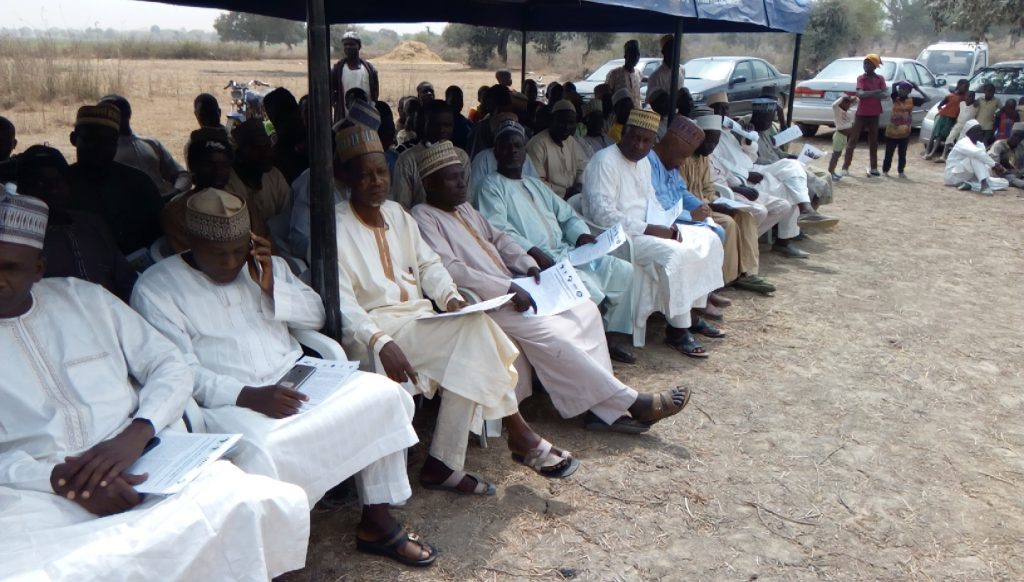TAAT excites wheat farmers with proven water management technologies

“These are very interesting and amazing technologies – with these, we will overcome many of the challenges we face now.”
With these words, Musa Shehu summed up the thoughts of many of the farmers in Alkamawa.
Shehu, who leads the Wheat Farmers Association in Kano made this remark at the just concluded Field Day to showcase proven water management technologies for improved wheat production in Alkamawa, Bunkure Local Government Area of Kano State in north-west Nigeria.
Organised by the Water Enabler Compact of Technologies for African Agricultural Transformation (TAAT) in collaboration with the Institute for Agricultural Research (IAR) of Ahmadu Bello University Zaria, the field day brought together over 200 stakeholders from across the densely populated state in northern Nigeria.
These include the representative of Dr. Nasiru Yusuf Gawuna, the state’s Deputy Governor who also heads the state ministry of agriculture, the Managing Director of Kano State Agricultural and Rural Development Authority (KNARDA) Hon. Suleiman Ibrahim who participated alongside 15 directors and Zonal Managers of his agency.
In attendance also were Directors of Engineering, Agricultural Services, Planning, and Veterinary departments of the Kano State Ministry of Agriculture and Natural Resources (KMANR), members of the Wheat Farmers Association, women, and youth groups.
Wheat in Nigeria
With a production of 60,000 tons annually, wheat remains the least cereal produced locally in Nigeria, although widely consumed.
In 2013, the country’s wheat consumption was estimated at 4.1 million tons creating a huge market potential for wheat supply gap.
According to a December 2018 Global Agricultural Information Network report from the U.S. Department of Agriculture (USDA), wheat importation to Nigeria in 2018-19 is estimated to increase by 4%.
This adds to the 5.4 million tonnes imported in 2017 thus indicating an increasing local demand for the cereal.
Wheat requires very well-drained soil, making it difficult to be grown in salty or acidic soil. The region of the country that supports wheat production includes Northern states such as Kaduna, Kano, Sokoto, Zamfara, Kebbi, Katsina, Yobe, Borno, Bauchi, Adamawa, Jigawa and Gombe.
However, local wheat production in Nigeria is fraught with challenges.
The variety of wheat cultivated in Nigeria is hard while the most popular types imported can’t grow in Nigeria as a result of the country’s soil and climatic condition.
Salim Mohammed, national president, Wheat Farmers Association of Nigeria, identifies lack of policy framework aimed at ensuring consistent supply of high yielding varieties of modified seeds to farmers and appropriate irrigation technologies as major concerns militating against massive production of wheat across the country.
Technology as a way out
It is against this background that the African Development Bank (AfDB) in 2018, launched the Technologies for African Agricultural Transformation (TAAT) as part of its Feed Africa Initiative.
TAAT’s main objective is to improve the business of agriculture across Africa by raising agricultural productivity, mitigating risks and
promoting diversification and processing in 18 agricultural value chains within eight priority intervention areas.
The programme increases agricultural productivity through the deployment of proven and high-performance agricultural technologies at scale along selected nine commodity compacts which include wheat.
These work with six enabler compacts addressing transversal issues such as soil fertility management, water management, capacity development, policy support, attracting African youth in agribusiness and fall armyworm response.
Smarting from the success stories recorded in Sudan where the TAAT Wheat Compact deployed a number of high yielding heat tolerant wheat varieties at scale (Imam, Goumria, Zakia, Elnielain and Bohaine) with a production potential of 5-8 t/ha and more than 26,000 tons of certified seeds produced and distributed to more than 260,000 wheat farmers, TAAT is already poised to transform Nigeria’s wheat sector.
Dr Solomon Assefa, the TAAT wheat compact leader identifies the lack of improved wheat seed in sufficient quantity and quality at affordable price as a key factor contributing to the poor adoption and weak performance of wheat in Nigeria.
These and many more prompted the scaling up of heat-tolerant wheat technologies to farmers in Nigeria.
“The technologies comprised many new wheat varieties with heat and drought tolerance, and stem rust resistance. These traits allow for expansion of wheat production in Nigeria, Assefa said.
“TAAT is fast-tracking this next generation variety release through national programs, offering expertise in land preparation including raised beds, furrow and deficit irrigation, and sprinkler systems, and promoting low-cost mechanized planting within conservation agriculture,” he added.
The TAAT Wheat Compact is led by International Centre for Agricultural Research in Dry Areas (ICARDA) while International Water Management Institute (IWMI) leads the TAAT Water Enabler Compact.
The TAAT Water Compact promotes low-cost and easy-to-deploy irrigation and water management technologies to small-scale farmers across Africa.
The water-wheat nexus
Prof. Henry Igbadun who coordinates the TAAT Water Enabler Compact (TAAT-WEC) in Nigeria disclosed during the Field Day that the programme is currently training 30 farmers and 10 extension workers in Kano State on proven water management technologies.
“Our target here is to scale up proven tools, technological solutions and innovations in irrigation and agricultural water management to increase productivity and production of wheat, rice and Sorghum,” Igbadun said.
“It is also to build the capacity of trainers, including innovation platform facilitators, extension agents, champion farmers and youths in the proper use of irrigation and water management technologies and implementation of good irrigation management practice.”
According to Igbadun, the initiative is also aimed at attracting investment from public and private sources into irrigated agricultural production of wheat, rice and sorghum through the demonstration of viability and profitability of irrigation technologies.
He added that, “traditionally, water is lifted from the tube well using centrifugal pumps and allowed to run by gravity on soil surfaces to the crop field.
“This method, he continued, is not only tedious, but it takes a longer time to irrigate the fields, more hours of running the irrigation pumps, higher water conveyance losses, and of fields.
The PVC conveyance and distribution technology is therefore appropriate to overcome these challenges. It saves time/hours of irrigation, which in turn reduces the cost of production and increases yield,” he said.
Prof. Igadun displayed several irrigation facilities at the field day and he mentioned some of them as “Impact Sprinklers, Gun Sprinklers, Weirs, Flumes, Spiles, and Orifices.”
On the Wheat field, the Gun Sprinklers, Impact Sprinklers are used to irrigate the field. These are in addition to the irrigation system known as “Improved surface irrigation using PVC pipes.
Shehu, the Kano Wheat Farmers leader, on his part, pledged to mobilise members of his association to adopt the technologies.
“Some of us have tested these technologies and it yielded good results. We are therefore calling on the government to come to our aid by continuing with the programme even after TAAT is gone,” Shehu added.
Engr. Rabiu Abdulkadir, the Director of Engineering and Service at the Kano State Ministry of Agriculture, in his closing remarks, commended TAAT for bringing such technologies to their doorstep during the Alkamawa field day.
Since these technologies, he continued, “will assist our farmers in curtailing the waste of water, thereby increasing the production of wheat, we are left with no choice as government, than to support this programme in order to ensure its sustainability,” Abdulkadir added.




